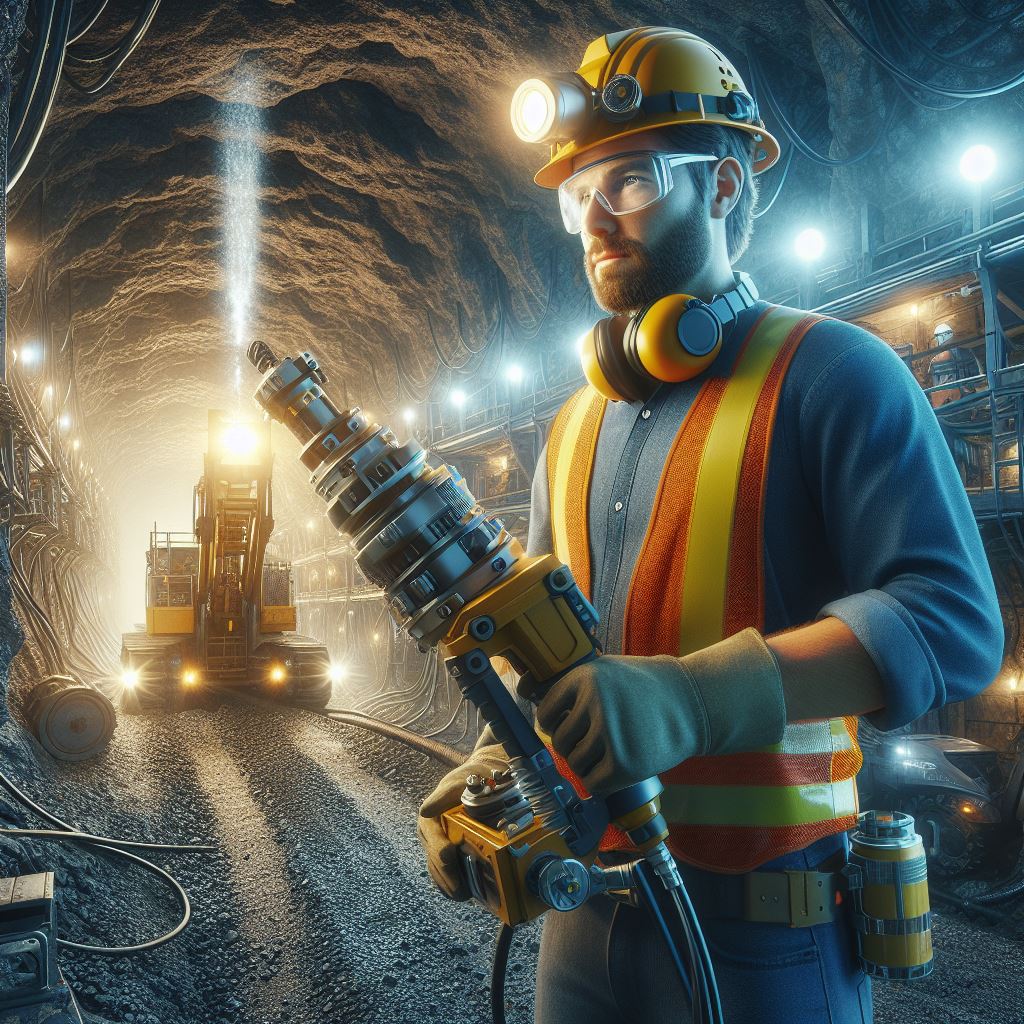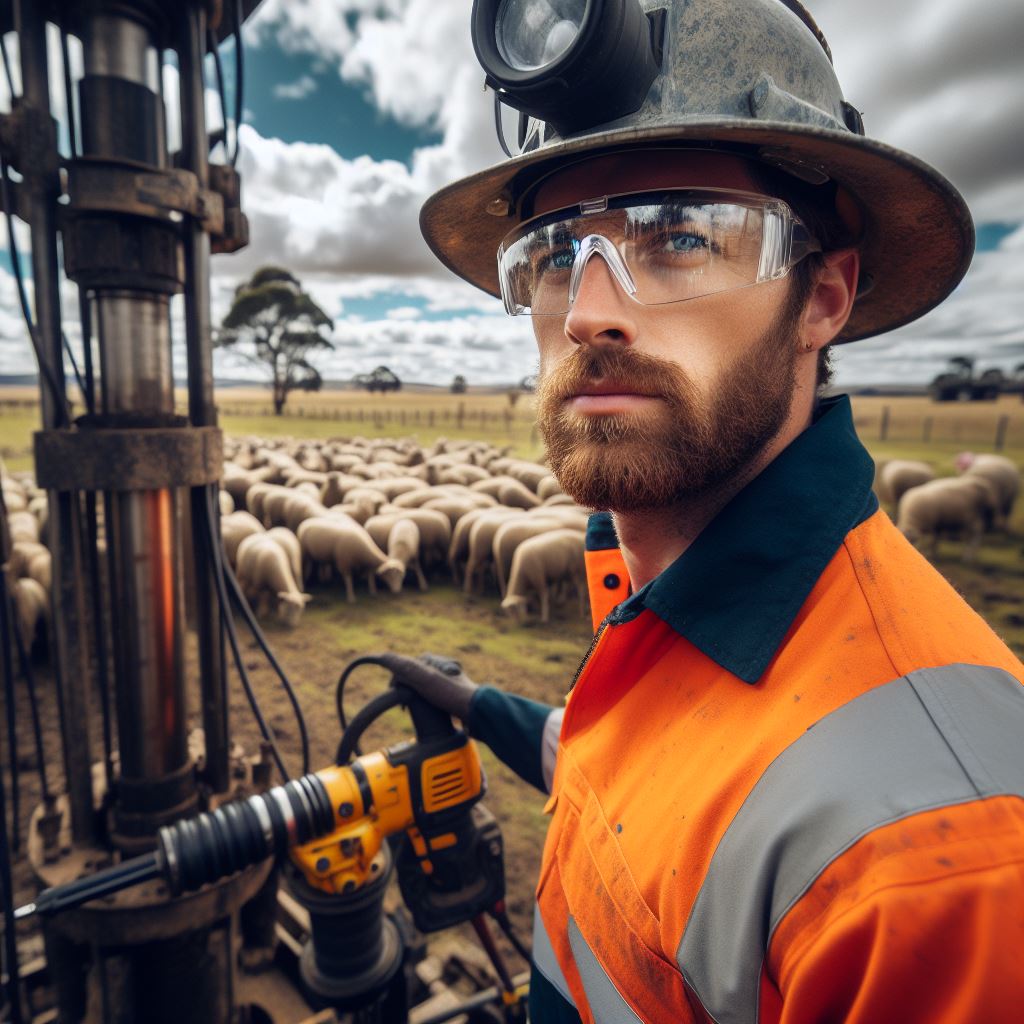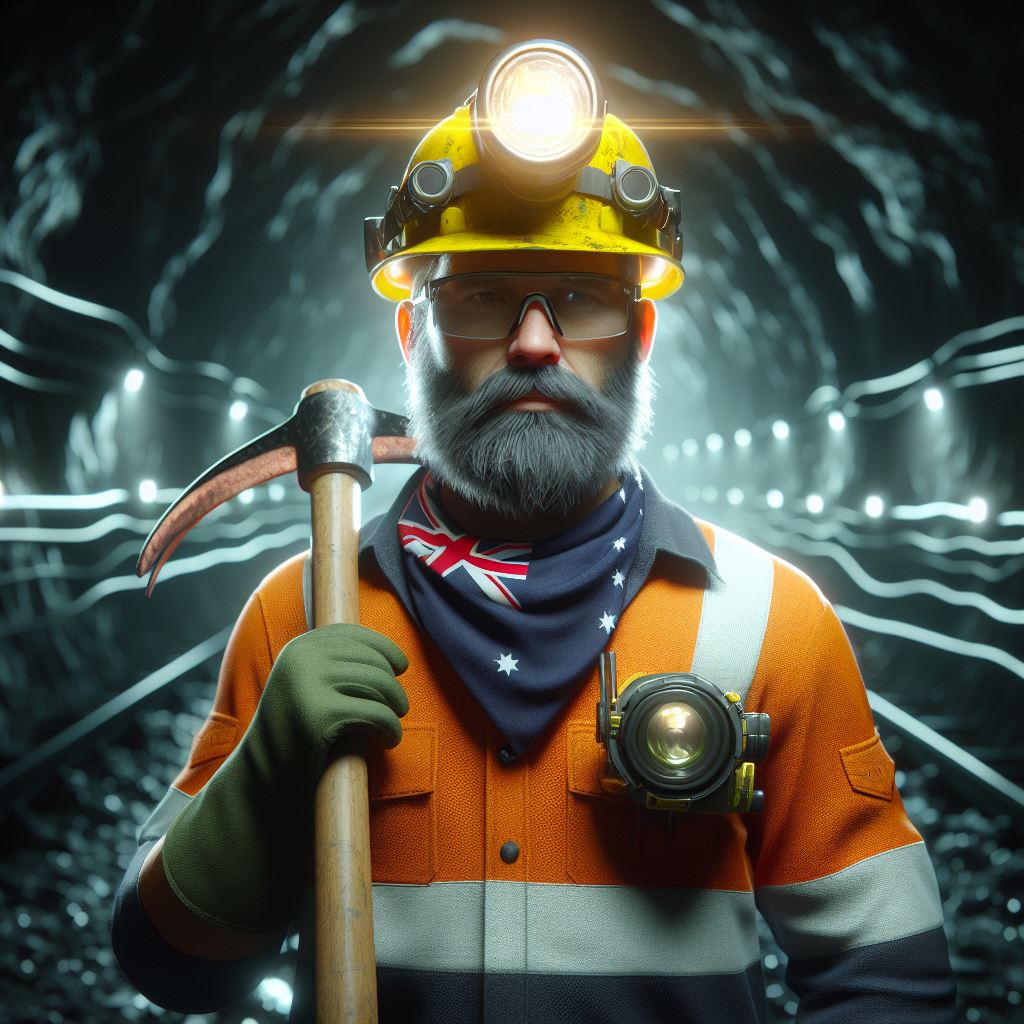Introduction
Brief explanation of what mining engineers do
Mining engineers play a crucial role in the Australian mining industry, ensuring the efficient and sustainable extraction of resources. This blog post will delve into the daily life of Australian mining engineers, shedding light on their responsibilities, challenges, and rewards.
As custodians of the mining process, mining engineers oversee the entire lifecycle of a mine, from exploration to closure. They employ scientific and technological expertise to locate mineral deposits, determine their viability, and devise optimal extraction methods.
Through feasibility studies and cost analysis, they maximize resource recovery while minimizing environmental impact.
Importance of mining engineers in the Australian mining industry
In the vast Australian mining landscape, mining engineers are vital for maintaining safety standards and compliance with regulations. They develop and implement safety protocols, conduct risk assessments, and mitigate potential hazards.
Their expertise in mine planning and designing infrastructure ensures efficient operations and adherence to strict timelines.
This blog post will further explore the technical skills required by mining engineers, encompassing data analysis, computer modeling, and use of advanced machinery.
It will highlight the collaborative nature of their work, as they liaise with geologists, environmental scientists, and production teams.
Overview of what the blog post will cover
Moreover, the post will delve into the challenges faced by mining engineers, such as remote work locations, long hours, and exposure to hazardous conditions.
However, it will also emphasize the fulfilling aspects of their job, including the opportunity to contribute to the nation’s economy and advancements in sustainable mining practices.
In general, this blog series aims to provide readers with a comprehensive understanding of the vital role played by Australian mining engineers in the booming mining industry. Stay tuned for the upcoming sections as we delve deeper into their daily experiences and achievements.
Education and Training
Required education and qualifications to become a mining engineer
- Completion of a bachelor’s degree in mining engineering, geology, or a related field.
- Obtaining relevant professional certifications, such as a Professional Engineer (PE) license.
- Gaining practical experience through internships or entry-level positions in the mining industry.
- Developing a strong foundation in mathematics, physics, geology, and computer science.
- Acquiring knowledge of mining regulations and safety protocols.
To become a mining engineer, individuals need to meet specific education and qualification requirements. A bachelor’s degree in mining engineering, geology, or a related field is a common starting point.
This degree program provides a comprehensive understanding of mining engineering principles and technologies.
During their studies, aspiring mining engineers develop strong foundations in mathematics, physics, geology, and computer science. They also acquire knowledge of mining regulations and safety protocols to ensure responsible mining practices.
Additionally, gaining practical experience through internships or entry-level positions in the mining industry is essential for building a strong resume.
Overview of common tertiary degrees in mining engineering
- Bachelor of Engineering (Mining): This degree offers comprehensive training in mining engineering principles and technologies.
- Master of Engineering (Mining): A postgraduate degree that provides advanced knowledge and research skills in mining engineering.
- Combined degrees: Some universities offer combined programs, such as Bachelor of Engineering and Bachelor of Commerce, to provide a diverse skill set.
- Ph.D. in Mining Engineering: For individuals interested in pursuing research and academic careers.
Upon completing their undergraduate degrees, mining engineers can pursue postgraduate education to further enhance their skills and career prospects.
Your Personalized Career Strategy
Unlock your potential with tailored career consulting. Get clear, actionable steps designed for your success. Start now!
Get StartedA Master of Engineering (Mining) degree offers advanced knowledge and research skills, enabling mining engineers to tackle complex industry challenges.
Some universities offer combined degrees, such as Bachelor of Engineering and Bachelor of Commerce, to provide a diverse skill set that prepares mining engineers for various roles within the industry.
Additionally, individuals interested in research and academic careers can pursue a Ph.D. in Mining Engineering.
Importance of continuous learning and professional development
- Keeping up with advancements in mining technology and best practices is crucial for career progression.
- Attending conferences, workshops, and seminars allows mining engineers to network and learn from industry experts.
- Maintaining membership in professional organizations, such as the Australasian Institute of Mining and Metallurgy (AusIMM), provides access to valuable resources and networking opportunities.
- Engaging in ongoing training programs ensures that mining engineers possess up-to-date knowledge of safety protocols and environmental regulations.
- Continuing education helps mining engineers stay competitive in a rapidly evolving industry.
Continuous learning and professional development are crucial for mining engineers to stay up-to-date with advancements in the field.
Attending conferences, workshops, and seminars allows engineers to network with industry experts and learn about the latest technologies and best practices.
Maintaining membership in professional organizations, such as AusIMM, provides access to valuable resources and networking opportunities.
These organizations often offer training programs and certifications that ensure mining engineers possess current knowledge of safety protocols and environmental regulations.
By engaging in continuous learning, mining engineers stay competitive in a rapidly evolving industry. Continuous education allows them to adapt to new technologies, address emerging challenges, and contribute to sustainable mining practices.
In essence, a strong educational foundation, including a bachelor’s degree in mining engineering, geology, or a related field, is crucial for aspiring mining engineers.
Pursuing advanced degrees and participating in continuous learning activities ensures that mining engineers possess up-to-date knowledge and skills necessary for success in the industry.
Read: Tech Advances in Enviro Management: AU Focus
Work Environment
As mining engineers, our typical work environment can vary between office-based and field-based work. We work in a demanding physical setting, often in remote and challenging locations.
Office-Based Work
- Many mining engineers spend a significant portion of their time working in an office.
- We utilize specialized software to analyze geological data and design mining plans.
- Collaboration with other engineers and professionals occurs through meetings and discussions.
- Office work also involves reviewing reports, preparing budgets, and monitoring project progress.
- We use our technical expertise to solve complex problems and ensure smooth operation of mining projects.
Field-Based Work
- Fieldwork is an important aspect of our job, where we directly interact with the mining site.
- We conduct site inspections, assess safety protocols, and supervise mining operations.
- Field-based work requires us to gather data through surveys, samples, and measurements.
- We work closely with technicians and mining staff to ensure compliance with engineering standards.
- Field visits also allow us to identify potential risks and implement necessary safety measures.
Physical Demands
- Mining engineering can be physically demanding, requiring strength and endurance.
- We may need to climb ladders, walk long distances, and navigate uneven terrains.
- Handling equipment and tools, such as explosives, can also be physically demanding.
- Additionally, we may be exposed to harsh weather conditions and extreme temperatures.
- Regular exercise and maintaining good physical health are crucial to meet the demands of the job.
Working in Remote and Challenging Locations
- Mining engineers often find themselves working in remote and challenging environments.
- These locations can include deserts, mountains, jungles, or offshore sites.
- Living in remote areas requires adaptability and resilience to cope with isolation.
- Access to basic amenities and healthcare facilities may be limited.
- Working in such environments requires us to be self-sufficient and well-prepared.
In short, mining engineers have a diverse work environment that combines office-based tasks with field-based responsibilities. We work with advanced technology, collaborate with professionals, and tackle complex challenges.
The physical demands of the job necessitate strength and endurance, while working in remote locations requires adaptability and resilience. Despite the challenges, mining engineering offers a rewarding career for those passionate about the industry.
Stand Out with a Resume That Gets Results
Your career is worth more than a generic template. Let us craft a resume and cover letter that showcase your unique strengths and help you secure that dream job.
Get HiredRead: Renewable Energy in AU Farms: Enviro Impact
Daily Responsibilities
Mining engineers have a wide range of tasks and responsibilities that they handle on a daily basis. These include:
- Designing and overseeing mining operations to extract valuable resources from the earth.
- Analyzing data and conducting calculations to determine the feasibility and profitability of mining projects.
- Ensuring that safety regulations are strictly followed to prevent accidents and injuries.
- Meeting environmental regulations to minimize the impact of mining activities on the ecosystem.
- Collaborating with geologists, surveyors, and other professionals to plan and execute mining projects.
Designing and overseeing mining operations
Mining engineers play a crucial role in designing and overseeing mining operations. They are responsible for determining the most efficient and effective methods of extracting valuable resources from the earth.
This involves evaluating the geological characteristics of the site and developing mining plans that optimize resource recovery.
Analyzing data and conducting calculations
Mining engineers are skilled in analyzing data and conducting calculations to assess the feasibility and profitability of mining projects. They use sophisticated software and modeling techniques to evaluate the economic viability of a mining operation.
This helps them make informed decisions regarding resource allocation and investment in new projects.
Ensuring safety and environmental regulations
One of the primary responsibilities of mining engineers is to ensure that safety regulations are strictly adhered to in mining operations. They develop and implement safety protocols and procedures to minimize the risk of accidents and injuries.
Additionally, they play a vital role in meeting environmental regulations by implementing measures to mitigate the impact of mining activities on the surrounding ecosystem.
Collaborating with other professionals and teams
Mining engineers work closely with a diverse range of professionals and teams. They collaborate with geologists to analyze geological data and identify potential mining sites.
They also work with surveyors to accurately measure and map mining areas. Furthermore, they coordinate with different teams, including operators, technicians, and maintenance personnel, to ensure smooth operations and efficient resource extraction.
In fact, mining engineers have a variety of tasks and responsibilities that they handle on a daily basis. They are involved in designing and overseeing mining operations, analyzing data, ensuring safety and environmental regulations are met, and collaborating with other professionals.
Their work is essential in extracting valuable resources while minimizing the impact on the environment and ensuring the well-being of all involved in the mining process.
Read: Soil Health: Top Priority for AU Enviro Experts

Learn More: Australia’s Mining Engineers: Education Pathways
Transform Your LinkedIn for Maximum Impact
Elevate your professional brand with a LinkedIn profile that attracts recruiters, showcases your expertise, and maximizes opportunities. Stand out in your industry with a profile built for success.
Boost ProfileDiscover More: Aussie Soil Health: Scientists’ Insight
Challenges and Rewards
Exploration of the challenges faced by mining engineers
Mining engineers face numerous challenges in their day-to-day work. From the planning stage to actual operations, they must overcome various obstacles to ensure a successful mining project.
One of the primary challenges they encounter is the extraction of minerals from deep underground. This process involves managing complex machinery, coordinating with other team members, and navigating through intricate cavern systems.
The safety of the engineers and the efficiency of the operations rely heavily on their ability to tackle these challenges effectively.
Discussion on working in extreme weather conditions
Another challenge for mining engineers is working in extreme weather conditions. Australia, known for its harsh climate, often presents engineers with scorching heat or unpredictable storms.
These conditions can make it difficult for engineers to carry out their tasks, as equipment may malfunction or become unresponsive. Additionally, extreme temperatures can pose health risks, such as dehydration or heat stroke.
To combat these challenges, mining engineers must be prepared with proper protective gear and adopt suitable strategies to minimize the impact of the weather on their work.
Mention of the pressure of meeting production targets
Meeting production targets is a constant pressure that mining engineers face. As part of their responsibilities, they must ensure that the mining site operates efficiently and produces the required amount of minerals within a given time frame.
This can be a challenging task, as unexpected equipment breakdowns, geological uncertainties, or workforce issues can arise and disrupt production.
Mining engineers must demonstrate exceptional problem-solving skills, adaptability, and resourcefulness to overcome these obstacles and meet the desired targets.
Highlighting the rewarding nature of the job, both financially and intellectually
Despite the challenges, being a mining engineer can be highly rewarding. Financially, mining engineers are often well-compensated for their work due to the demanding nature of the job and the skills required.
In Australia, where the mining industry plays a significant role in the economy, mining engineers can enjoy competitive salaries and benefits.
Furthermore, the job offers intellectual satisfaction as engineers are constantly engaged in problem-solving, innovation, and optimizing mining processes to improve efficiency and sustainability.
Reference to the career progression opportunities within the industry
The mining industry provides excellent career progression opportunities for mining engineers. Professionals can move from entry-level positions to senior management roles, depending on their skills, experience, and expertise.
They have the opportunity to work on diverse projects, gain exposure to different mining methods, and develop specialized knowledge in areas like environmental management, technology implementation, or optimization strategies.
Additionally, mining engineers can expand their horizons by working internationally or transitioning into related fields such as consultancy or research and development.
In summary, mining engineering is a challenging yet rewarding profession. Mining engineers face various challenges, including navigating underground caverns, working in extreme weather conditions, and meeting production targets.
However, the job offers financial stability, intellectual stimulation, and ample opportunities for career growth within the mining industry.
Read: Biodiversity: Enviro Manager’s Role in AU
Uncover the Details: Top Skills Needed for AU’s Enviro Managers
Work-Life Balance
Importance of maintaining a healthy work-life balance
- A healthy work-life balance is crucial for the overall well-being and happiness of mining engineers.
- It allows them to have a fulfilling personal life and avoid burnout in their professional careers.
- Maintaining a healthy work-life balance also improves their productivity and job satisfaction.
- It helps them to better manage stress and maintain good mental and physical health.
Discussion on the irregular working hours and shifts
- Australian mining engineers often work irregular hours and shifts due to the nature of their job.
- They may have to work night shifts or be on call during weekends and holidays.
- The irregular working hours can make it challenging for mining engineers to maintain a healthy work-life balance.
- It can affect their sleep patterns, social life, and time spent with family and friends.
Overview of the time spent away from home due to remote projects
- Australian mining engineers often have to spend significant amounts of time away from home due to remote mining projects.
- They may have to live in remote areas or fly in and out of the project site.
- This can lead to a considerable amount of time spent away from their families and loved ones.
- It can put a strain on their personal relationships and make maintaining a work-life balance more challenging.
Reference to various strategies and support systems for maintaining work-life balance
- Australian mining engineers can implement various strategies to maintain a healthy work-life balance.
- They can schedule regular breaks and vacations to spend quality time with family and recharge.
- They can also engage in hobbies and activities they enjoy outside of work.
- It is important for mining engineers to have open communication with their supervisors and colleagues about their work-life balance needs.
- Support systems such as counseling services, employee assistance programs, and flexible work arrangements can also help in maintaining work-life balance.
- Maintaining a healthy work-life balance is essential for Australian mining engineers’ overall well-being and job satisfaction.
- Despite the challenges posed by irregular working hours and time spent away from home, strategies and support systems can help them achieve a better work-life balance.
- By prioritizing their personal lives and taking care of their mental and physical health, mining engineers can excel in their profession while enjoying a fulfilling personal life.
Find Out More: Mining Engineer Careers in Australia’s Outback
Uncover the Details: Foresters’ Impact on Australian Ecology
Conclusion
In closing, being a mining engineer is a demanding yet rewarding profession. Mining engineers play a crucial role in the Australian mining industry, ensuring the extraction of valuable resources and the optimization of mining operations.
They face various challenges, from designing and planning mines to solving technical issues and ensuring safety.
A mining engineer’s day-to-day life involves analyzing data, collaborating with teams, visiting mine sites, and implementing effective strategies. The significance of mining engineers cannot be understated, as they contribute to the growth and sustainability of the industry.
For aspiring mining engineers, this profession offers exciting opportunities for learning, exploration, and making a positive impact. To the professionals in the field, your dedication and expertise are greatly appreciated.
Keep pushing boundaries and inspiring others to pursue a career in mining engineering. Together, we can shape the future of the Australian mining industry and contribute to its long-term success.




